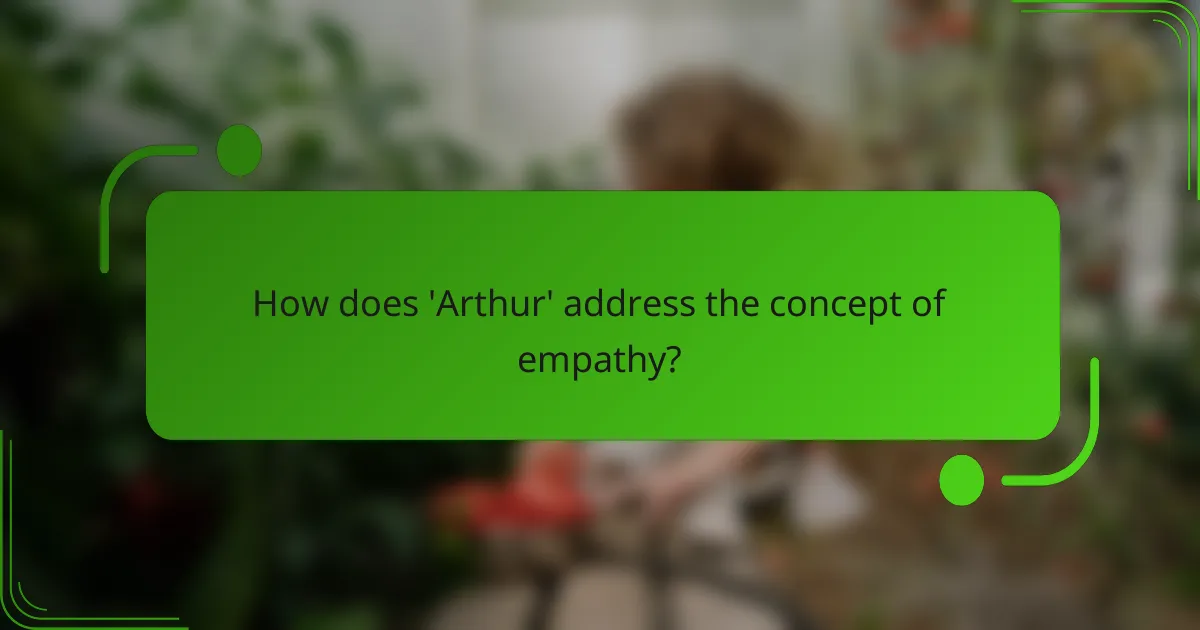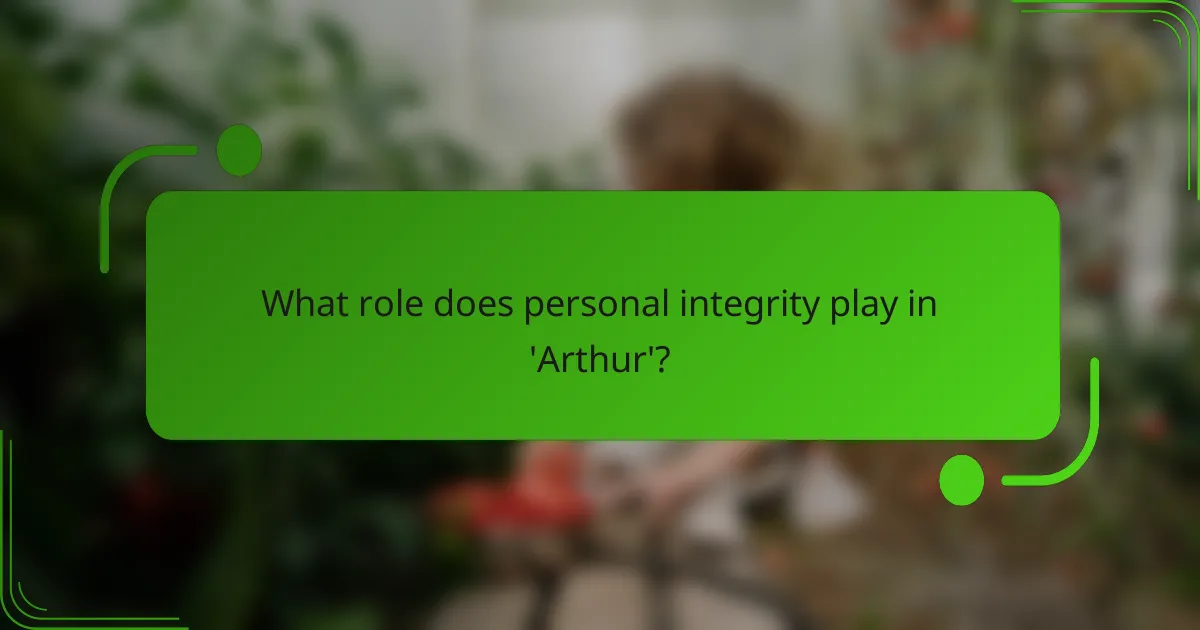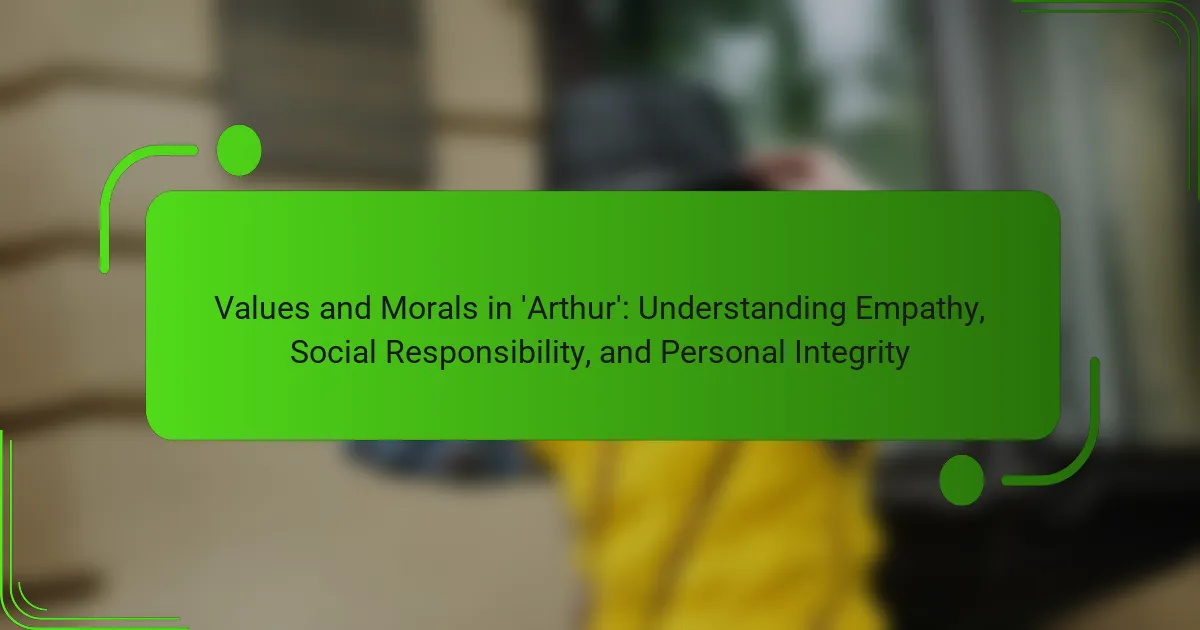The article focuses on the core values and morals presented in the animated series ‘Arthur’, specifically highlighting empathy, social responsibility, and personal integrity. Empathy is illustrated through characters who support each other’s emotional challenges, fostering stronger friendships and community bonds. Social responsibility is emphasized by teaching children the importance of helping others and participating actively in their communities. Personal integrity is portrayed through characters who make honest and fair choices, influencing their peers positively. These themes are integral to the educational impact of ‘Arthur’, reinforcing essential life lessons for young audiences.

What are the core values and morals presented in ‘Arthur’?
The core values and morals presented in ‘Arthur’ include empathy, social responsibility, and personal integrity. Empathy is shown through characters understanding and supporting each other’s feelings. Social responsibility is emphasized by teaching children the importance of helping others and being active community members. Personal integrity is demonstrated when characters make choices based on honesty and fairness. These themes are consistently reinforced throughout the series, making them central to its educational impact.
How do empathy, social responsibility, and personal integrity manifest in the show?
Empathy, social responsibility, and personal integrity manifest in ‘Arthur’ through character interactions and storylines. Characters often demonstrate empathy by understanding and sharing the feelings of others. For example, Arthur helps his friends navigate emotional challenges, showcasing emotional awareness. Social responsibility is evident when characters engage in community service or help those in need. Episodes often revolve around themes of teamwork and helping others, reinforcing the importance of contributing to society. Personal integrity is portrayed through characters making ethical choices, even when faced with peer pressure. Arthur frequently stands up for what is right, illustrating moral courage. These elements collectively promote positive values, making the show a powerful tool for teaching empathy, social responsibility, and integrity.
What specific episodes illustrate these values?
The episodes “Arthur’s Eyes,” “The Big Blow-Up,” and “D.W. All Wet” illustrate the values of empathy, social responsibility, and personal integrity. In “Arthur’s Eyes,” Arthur learns to empathize with his friends when he faces challenges with his glasses. This episode highlights the importance of understanding others’ feelings. “The Big Blow-Up” showcases social responsibility as Arthur and his friends confront a misunderstanding that affects their community. They learn the value of teamwork and communication. In “D.W. All Wet,” personal integrity is emphasized when D.W. stands up for her beliefs, despite peer pressure. Each episode reinforces core values through relatable situations and character development.
How do the characters demonstrate these morals in their actions?
Characters in ‘Arthur’ demonstrate morals through their actions by showing empathy, social responsibility, and personal integrity. For example, Arthur frequently helps his friends when they face challenges. He listens to their problems and offers support, illustrating empathy.
Buster often stands up for classmates being bullied, showcasing social responsibility. He takes action to protect others, reinforcing the importance of standing up for what is right.
Additionally, D.W. learns the value of honesty when she confesses to a mistake. Her willingness to admit wrongdoing highlights personal integrity.
These actions collectively reflect the core morals of the series, emphasizing the importance of empathy, responsibility, and integrity in everyday life.
Why are these values important for children’s development?
Values such as empathy, social responsibility, and personal integrity are crucial for children’s development. These values help children form healthy relationships with peers and adults. Empathy enables children to understand and share the feelings of others. This understanding fosters compassion and reduces bullying behavior. Social responsibility teaches children the importance of contributing positively to their communities. Engaging in community service can enhance their sense of belonging and purpose. Personal integrity instills a sense of honesty and ethical behavior. Children with strong integrity are more likely to make positive choices in challenging situations. Research shows that children who develop these values are better equipped to navigate social complexities. They tend to perform better academically and exhibit lower rates of behavioral issues.
How does ‘Arthur’ teach empathy to its audience?
‘Arthur’ teaches empathy to its audience through relatable storytelling. The characters often face real-life challenges that require understanding and compassion. For instance, episodes depict situations where characters must consider others’ feelings. This encourages viewers to reflect on their own actions. The show uses dialogue that emphasizes the importance of listening and supporting friends. Additionally, ‘Arthur’ showcases diverse perspectives, allowing children to see situations from different viewpoints. This representation fosters a deeper connection to others’ experiences. The consistent themes of kindness and cooperation reinforce the value of empathy throughout the series.
What role does social responsibility play in the narrative?
Social responsibility serves as a fundamental theme in the narrative of ‘Arthur’. It emphasizes the importance of caring for others and contributing positively to the community. Characters often face dilemmas that challenge their sense of duty towards friends and society. For instance, Arthur and his friends frequently engage in activities that promote kindness and support. These actions illustrate the impact of social responsibility on personal growth and relationships. The narrative consistently reinforces the idea that individual actions can lead to collective betterment. This portrayal encourages young viewers to adopt socially responsible behaviors in their own lives.

How does ‘Arthur’ address the concept of empathy?
‘Arthur’ addresses the concept of empathy by showcasing characters who understand and share the feelings of others. The show often presents scenarios where characters face emotional challenges. For instance, Arthur and his friends frequently help each other during difficult times. These interactions highlight the importance of listening and supporting one another. The series emphasizes that empathy can lead to stronger friendships and community bonds. Episodes often conclude with lessons about recognizing others’ feelings. This approach reinforces the value of compassion in everyday situations. Overall, ‘Arthur’ effectively teaches young audiences about the significance of empathy.
What are the different forms of empathy depicted in the series?
The series depicts several forms of empathy. These include cognitive empathy, emotional empathy, and compassionate empathy. Cognitive empathy allows characters to understand others’ perspectives. Emotional empathy enables characters to share and feel another’s emotions. Compassionate empathy motivates characters to take action to help others. Each form is illustrated through various character interactions and storylines. For example, Arthur often demonstrates cognitive empathy by considering his friends’ feelings. Emotional empathy is evident when characters comfort each other during difficult times. Compassionate empathy is shown when characters engage in community service or support peers in need.
How do characters respond to each other’s feelings?
Characters in ‘Arthur’ respond to each other’s feelings with empathy and understanding. They often express concern when a friend is upset. For example, when Arthur sees Buster feeling down, he offers support and encouragement. This demonstrates their ability to recognize emotional cues. Characters engage in active listening, which helps validate each other’s feelings. They often share personal experiences to relate to one another. This mutual understanding fosters strong friendships. The show emphasizes the importance of kindness and compassion in resolving conflicts. Overall, these responses highlight the values of empathy and social responsibility central to the series.
What lessons about empathy can viewers learn from ‘Arthur’?
Viewers can learn that empathy involves understanding and sharing the feelings of others in ‘Arthur’. The show often depicts characters facing various challenges. For example, Arthur and his friends frequently encounter situations that require them to consider others’ perspectives. Episodes highlight the importance of listening and supporting friends in need. Characters learn to apologize and make amends after conflicts. This reinforces the idea that empathy fosters stronger relationships. Overall, ‘Arthur’ teaches that practicing empathy leads to a more compassionate community.
In what ways does ‘Arthur’ promote social responsibility?
‘Arthur’ promotes social responsibility through its emphasis on community engagement and empathy. The show often showcases characters participating in community service projects. These projects highlight the importance of helping others and being active citizens. Episodes frequently address social issues, encouraging discussions about fairness and kindness. The characters model positive behaviors, such as sharing and cooperation. This reinforces the idea that individual actions can impact the community. By presenting relatable scenarios, ‘Arthur’ inspires young viewers to consider their roles in society. The series effectively teaches that social responsibility is a shared value.
Which community issues are highlighted in the show?
The show highlights various community issues, including bullying, environmental awareness, and inclusivity. Bullying is portrayed through characters facing peer pressure and learning to stand up for themselves. Environmental awareness is emphasized through episodes that promote recycling and caring for nature. Inclusivity is addressed by showcasing diverse characters and their experiences. These themes reflect real-life challenges children face in their communities. Each issue is presented in a relatable manner, encouraging discussions about empathy and social responsibility among viewers.
How do the characters engage in community service or support?
The characters in ‘Arthur’ engage in community service and support through various activities. They participate in food drives, clean-up events, and fundraising efforts. For instance, Arthur and his friends often organize events to help those in need. They volunteer at local shelters and assist in community projects. These actions reflect their commitment to social responsibility. The show emphasizes the importance of empathy and helping others. Characters learn valuable lessons about the impact of their contributions. This reinforces the show’s themes of personal integrity and moral values.

What role does personal integrity play in ‘Arthur’?
Personal integrity is fundamental in ‘Arthur.’ It shapes character development and moral lessons throughout the series. Arthur demonstrates honesty and responsibility in his actions. He often faces dilemmas that test his values. These moments highlight the importance of staying true to oneself. The narrative emphasizes that integrity leads to trust and respect among peers. For example, Arthur’s decisions often inspire his friends to act with integrity as well. This creates a positive influence within the community depicted in the show. Overall, personal integrity is portrayed as essential for personal growth and social harmony in ‘Arthur.’
How do characters demonstrate personal integrity throughout the series?
Throughout the series, characters demonstrate personal integrity by consistently making ethical choices. They often prioritize honesty over convenience. For instance, Arthur regularly admits his mistakes and seeks to make amends. Buster shows integrity by standing up for his friends, even when it is difficult. Francine displays loyalty by supporting her friends in tough situations. Each character faces moral dilemmas that test their values. Their decisions often reflect a commitment to doing what is right. This is evident when they choose to help others in need. The series emphasizes the importance of integrity in building strong relationships and community.
What challenges do characters face in maintaining their integrity?
Characters face numerous challenges in maintaining their integrity. Peer pressure often leads them to compromise their values. For example, they may feel compelled to conform to group norms that contradict their beliefs. Additionally, external circumstances can create moral dilemmas. Characters might encounter situations where doing the right thing results in personal loss or social ostracism. Temptation also plays a significant role; characters may be lured by rewards that conflict with their principles. Furthermore, internal conflicts can arise when characters struggle between their desires and ethical standards. These challenges highlight the complexities of upholding integrity in various situations.
How do these challenges contribute to character development?
Challenges contribute to character development by fostering resilience and adaptability. When faced with obstacles, individuals learn to navigate difficulties. This process enhances problem-solving skills and critical thinking. Additionally, challenges often require individuals to confront their values and morals. For example, characters in ‘Arthur’ face dilemmas that test their empathy and social responsibility. These experiences shape their understanding of personal integrity. Research indicates that overcoming challenges leads to increased self-awareness and emotional growth. This growth is essential for developing a strong moral compass.
What are some practical lessons on integrity that can be taken from ‘Arthur’?
‘Arthur’ teaches several practical lessons on integrity. One lesson is the importance of honesty. Characters in the show often face situations where telling the truth is crucial. For example, Arthur learns that being honest about his mistakes fosters trust among friends. Another lesson is standing up for what is right. In various episodes, characters confront peer pressure and choose to act with integrity despite challenges. Additionally, the show emphasizes accountability. Characters are shown taking responsibility for their actions, demonstrating that integrity involves owning up to one’s mistakes. Lastly, ‘Arthur’ illustrates the value of empathy. Understanding others’ feelings can guide individuals to act with integrity. These lessons collectively highlight integrity as essential for building strong relationships and a supportive community.
How can viewers apply these lessons in real life?
Viewers can apply the lessons of empathy, social responsibility, and personal integrity from ‘Arthur’ in their daily interactions. Practicing empathy involves actively listening to others and understanding their feelings. For instance, when a friend is upset, showing support can strengthen relationships. Social responsibility can be demonstrated by participating in community service or helping those in need. Engaging in local initiatives fosters a sense of belonging and encourages teamwork. Personal integrity is crucial for building trust. Making honest decisions, even when difficult, reflects strong character. Research shows that individuals who exhibit these values contribute positively to their communities, enhancing social cohesion.
What strategies can parents use to discuss values and morals from ‘Arthur’ with their children?
Parents can use various strategies to discuss values and morals from ‘Arthur’ with their children. One effective approach is to watch episodes together and pause to ask questions. This encourages children to express their thoughts on characters’ decisions. Another strategy is to relate the show’s themes to real-life situations. Parents can discuss how the characters demonstrate empathy and social responsibility. Role-playing scenarios from the show can help children understand moral dilemmas. Additionally, parents can create open dialogues about feelings and choices portrayed in ‘Arthur’. Sharing personal experiences that align with the show’s lessons reinforces learning. These strategies promote critical thinking and help children internalize values.
The main entity of the article is the animated series ‘Arthur’, which focuses on the core values and morals of empathy, social responsibility, and personal integrity. The article provides an overview of how these values manifest through character interactions, specific episodes, and the lessons they impart to young viewers. It highlights the significance of these morals for children’s development, illustrating practical applications and strategies for parents to discuss these themes with their children. The discussion includes examples from the series that reinforce the importance of understanding others’ feelings, contributing to the community, and maintaining ethical behavior in daily life.
